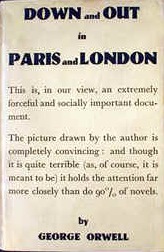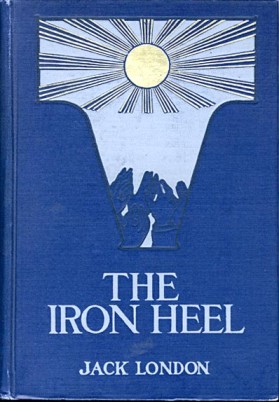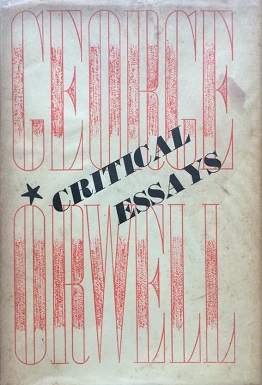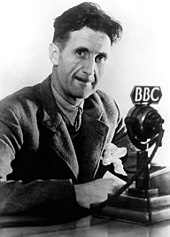
Eric Arthur Blair was an English novelist, poet, essayist, journalist, and critic who wrote under the pen name of George Orwell. His work is characterised by lucid prose, social criticism, opposition to totalitarianism, and support of democratic socialism.

Keep the Aspidistra Flying, first published in 1936, is a socially critical novel by George Orwell. It is set in 1930s London. The main theme is Gordon Comstock's romantic ambition to defy worship of the money-god and status, and the dismal life that results.

Down and Out in Paris and London is the first full-length work by the English author George Orwell, published in 1933. It is a memoir in two parts on the theme of poverty in the two cities. Its target audience was the middle- and upper-class members of society—those who were more likely to be well educated—and it exposes the poverty existing in two prosperous cities: Paris and London. The first part is an account of living in near-extreme poverty and destitution in Paris and the experience of casual labour in restaurant kitchens. The second part is a travelogue of life on the road in and around London from the tramp's perspective, with descriptions of the types of hostel accommodation available and some of the characters to be found living on the margins.

John Boynton Priestley was an English novelist, playwright, screenwriter, broadcaster and social commentator.

"Politics and the English Language" (1946) is an essay by George Orwell that criticised the "ugly and inaccurate" written English of his time and examined the connection between political orthodoxies and the debasement of language.

The Iron Heel is a political novel in the form of science fiction by American writer Jack London, first published in 1908.
Graham Vivian Sutherland was a prolific English artist. Notable for his paintings of abstract landscapes and for his portraits of public figures, Sutherland also worked in other media, including printmaking, tapestry and glass design.

Cyril Vernon Connolly CBE was an English literary critic and writer. He was the editor of the influential literary magazine Horizon (1940–49) and wrote Enemies of Promise (1938), which combined literary criticism with an autobiographical exploration of why he failed to become the successful author of fiction that he had aspired to be in his youth.

Thomas Walker Hobart Inskip, 1st Viscount Caldecote, was a British politician who served in many legal posts, culminating in serving as Lord Chancellor from 1939 until 1940. Despite legal posts dominating his career for all but four years, he is most prominently remembered for serving as Minister for Coordination of Defence from 1936 until 1939.

Helen Violet Bonham Carter, Baroness Asquith of Yarnbury,, known until her marriage as Violet Asquith, was a British politician and diarist. She was the daughter of H. H. Asquith, Prime Minister from 1908 to 1916, and she was known as Lady Violet, as a courtesy title, from her father's elevation to the peerage as Earl of Oxford and Asquith in 1925. Later she became active in Liberal politics herself, and was a leading opponent of appeasement. She stood for Parliament and became a life peer.

The People of the Abyss (1903) is a book by Jack London, containing his first-hand account of several weeks spent living in the Whitechapel district of the East End of London in 1902. London attempted to understand the working-class of this deprived area of the city, sleeping in workhouses or on the streets, and staying as a lodger with a poor family. The conditions he experienced and wrote about were the same as those endured by an estimated 500,000 of the contemporary London poor.

Horizon: A Review of Literature and Art was a literary magazine published in London, UK, between December 1939 and January 1950. Published every four weeks, it was edited by Cyril Connolly, who made it into a platform for a wide range of distinguished and emerging writers. It had a print run of 120 issues or 20 volumes.
"Second Thoughts on James Burnham" is an essay, first published in May 1946 in Polemic, by the English author George Orwell. The essay discusses works written by James Burnham, an American political theorist.

Nineteen Eighty-Four is a dystopian novel and cautionary tale by English writer George Orwell. It was published on 8 June 1949 by Secker & Warburg as Orwell's ninth and final book completed in his lifetime. Thematically, it centres on the consequences of totalitarianism, mass surveillance, and repressive regimentation of people and behaviours within society. Orwell, a staunch believer in democratic socialism and member of the anti-Stalinist Left, modelled the Britain under authoritarian socialism in the novel on the Soviet Union in the era of Stalinism and on the very similar practices of both censorship and propaganda in Nazi Germany. More broadly, the novel examines the role of truth and facts within societies and the ways in which they can be manipulated.

Christopher Hitchens was a prolific British and American author, political journalist and literary critic. His books, essays, and journalistic career spanned more than four decades. Recognized as a public intellectual, he was a staple of talk shows and lecture circuits. Hitchens was a columnist and literary critic at The Atlantic, Vanity Fair, Slate, World Affairs, The Nation, Free Inquiry, and a variety of other media outlets.
Spilling the Spanish Beans is an article, in two parts, by George Orwell, that first appeared in the New English Weekly of 29 July and 2 September 1937.
This is a bibliography of books by or about the director and actor Orson Welles.

Critical Essays (1946) is a collection of wartime pieces by George Orwell. It covers a variety of topics in English literature, and also includes some pioneering studies of popular culture. It was acclaimed by critics, and Orwell himself thought it one of his most important books.
Sarah Morewood (1823–1863) was a poet and literary figure who developed a close relationship in the 1850s with her nearest neighbor in the Berkshires, the novelist Herman Melville. In 1983 Professor Michael Rogin of the University of California, Berkeley, was the first to suggest that Morewood was a model for the character of Isabel in Melville's dark novel of romance and ambition Pierre; or, The Ambiguities (1852). Thirty-three years later biographer Michael Shelden argued in Melville in Love (2016) that Morewood influenced Melville's work not only in Pierre, but also in Moby-Dick (1851), and that for much of the 1850s the two were lovers.

The Bibliography of Winston Churchill includes the major scholarly and nonfiction books and scholarly articles on the career of Winston Churchill, as well as other online sources of information.















